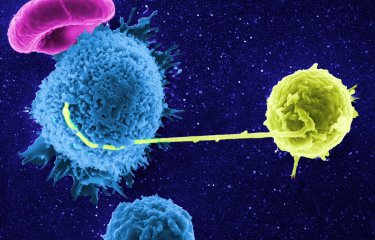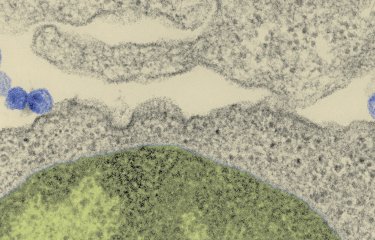In developing countries, where access to laboratory tests remains limited, could use of a criterion as simple as weight gain improve the management of HIV-infected patients receiving antiretroviral therapy? This is what has been suggested by a research published in the AIDS journal and conducted by researchers from the Institut Pasteur in partnership with Médecins Sans Frontières. Now that access to antiretroviral therapy is growing, it seems essential to propose easy-to-implement and inexpensive methods to monitor patients receiving treatment.
Press release
Paris, april 8, 2009
In developing countries, a new problem has arisen — how to manage monitoring for the increasing number of patients receiving antiretroviral therapy. In some areas, scarce doctors have been replaced by nurses or health workers for this monitoring and this has proved effective but simplified and standardized methods are required. As access to laboratory tests is limited, it is essential to identify simple tools for assessing the progression of the disease. Weight loss or gain is a potential tool as it is easy and inexpensive to measure.
The cohort study, conducted by Yoann Madec from the Epidemiology of Emerging Diseases unit (headed by Arnaud Fontanet at the Institut Pasteur), focused on hundreds of HIV-infected adult patients who had begun antiretroviral therapy: 2,541 Cambodians and 2,618 Kenyans. These patients were part of Médecins Sans Frontières programs in Phnom Penh, Cambodia, and Homa Bay, Kenya and were monitored for 2 ½ years on average.
The purpose was to identify the factors associated with observed weight gain and to assess the prognostic value of weight gain on death, to determine whether it could be used as a monitoring tool for patients receiving antiretroviral therapy.
The research shows that, in patients who have begun antiretroviral therapy and are suffering from moderate to severe malnutrition (i.e. almost one in two people in the cohorts studied), weight gain is closely linked to survival. Three months after beginning treatment, those with a weight gain below or equal to 5% are six times more at risk from dying within three months than a patient whose weight gain exceeds 10%. Those with a weight gain below or equal to 10% are three times more at risk.
In addition, this prognostic value, obtained by measuring weight gain, is “universal”. It remains significant regardless of patient gender, clinical stage at treatment initiation, CD4 count at treatment initiation, and type of therapy used.
According to this research, more advanced analyses should be performed in patients presenting with insufficient weight gain after three or six months of therapy, as such data could indicate the presence of an opportunistic disease. Tests should be conducted for tuberculosis, for example, as it is one of the main causes of death in HIV-infected patients in developing countries. Insufficient weight gain can also indicate poor patient compliance to treatment.
“Additional research needs to be conducted in other countries to confirm that these results can be generalized to other areas”, highlight the authors, who conclude: “our results must not be taken as an argument in favor of minimal monitoring of patients receiving antiretroviral therapy in developing countries. CD4 count and viral load remain the most effective tools for patient monitoring and efforts must be made to make these tests available to countries with limited resources. However, while waiting for greater access to these tests, simple monitoring tools — such as measuring weight — can provide valuable help and should not be overlooked if they can provide health workers with important patient information.”
Sources:
Source: “Weight gain at 3 months of ART is strongly associated with survival: evidence from two developing countries”. AIDS, 10 April 2009
Yoann Madec (1), Elisabeth Szumilin (2), Christine Genevier (2,3), Laurent Ferradini (2,4), Suna Balkan (2), Mar Pujades (5), Arnaud Fontanet (1)
1 Epidemiology of Emerging Diseases, Institut Pasteur, 25-28, rue du Docteur Roux, 75015 Paris, France
2 Médecins Sans Frontières, 8 rue Saint Sabin, 75011 Paris, France
3 Médecins Sans Frontières, Nairobi, Kenya
4 Médecins Sans Frontières, Phnom Penh, Cambodia
5 Epicentre, 42 bis boulevard Richard Lenoir, 75011 Paris, France.
Contact persons:
- Institut Pasteur Press Office : Corinne Jamma or Nadine Peyrolo –
+33 (0)1 40 61 33 41 – cjamma@pasteur.fr
- Médecins Sans Frontières Press Office:
Anne Yzèbe – Tel.: + 33 (0)1 40 21 28 43 - anne.yzebe@paris.msf.org





